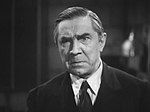Portal:Speculative fiction/Selected horror profiles
Selected horror profiles
Usage
The layout design for these subpages is at Portal:Speculative fiction/Selected works/Layout.
- Add a new Selected work to the next available subpage.
- Update "max=" to new total for its {{Random portal component}} on the main page. (Edit main page)
Selected works lists
Horror
Portal:Speculative fiction/Selected horror profile/1
Edgar Allan Poe (January 19, 1809 – October 7, 1849) was an American writer, poet, editor and literary critic, considered part of the American Romantic Movement. Best known for his tales of mystery and the macabre, Poe was one of the earliest American practitioners of the short story and is considered the inventor of the detective-fiction genre. He is further credited with contributing to the emerging genre of science fiction. He was the first well-known American writer to try to earn a living through writing alone, resulting in a financially difficult life and career.He attended the University of Virginia for one semester but left due to lack of money. Poe's publishing career began humbly, with an anonymous collection of poems, Tamerlane and Other Poems (1827), credited only to "a Bostonian". Poe switched his focus to prose and spent the next several years working for literary journals and periodicals, becoming known for his own style of literary criticism. In January 1845, Poe published his poem "The Raven" to instant success. His wife died of tuberculosis two years later. He began planning to produce his own journal, The Penn (later renamed The Stylus), though he died before it could be produced.
Poe and his works influenced literature in the United States and around the world, as well as in specialized fields, such as cosmology and cryptography. Poe and his work appear throughout popular culture in literature, music, films, and television. A number of his homes are dedicated museums today.
Portal:Speculative fiction/Selected horror profile/2
Mary Shelley (née Mary Wollstonecraft Godwin; 30 August 1797 – 1 February 1851) was a British novelist, short story writer, dramatist, essayist, biographer, and travel writer, best known for her Gothic novel Frankenstein: or, The Modern Prometheus (1818). She also edited and promoted the works of her husband, the Romantic poet and philosopher Percy Bysshe Shelley. Her father was the political philosopher William Godwin, and her mother was the philosopher and feminist Mary Wollstonecraft.Mary Godwin's mother died when she was eleven days old; afterwards, she and her older half-sister, Fanny Imlay, were raised by her father. When Mary was four, Godwin married his neighbour, Mary Jane Clairmont. Godwin provided his daughter with a rich, if informal, education, encouraging her to adhere to his liberal political theories. In 1814, Mary Godwin began a romantic relationship with one of her father’s political followers, the married Percy Bysshe Shelley. Together with Mary's stepsister, Claire Clairmont, they left for France and travelled through Europe; upon their return to England, Mary was pregnant with Percy's child. Over the next two years, she and Percy faced ostracism, constant debt, and the death of their prematurely born daughter. They married in late 1816 after the suicide of Percy Shelley's first wife, Harriet.
Portal:Speculative fiction/Selected horror profile/3
Robert Ervin Howard (January 22, 1906 – June 11, 1936) was an American author who wrote pulp fiction in a diverse range of genres. He is regarded as the father of the Sword and Sorcery genre and he created, amongst other characters, Conan the Cimmerian. Howard created Conan the Barbarian, in the pages of the Depression-era pulp magazine Weird Tales, a character whose pop-culture imprint has been compared to such icons as Tarzan, Count Dracula, Sherlock Holmes, and James Bond.Howard was born and raised in the state of Texas. He spent most of his life in the town of Cross Plains with some time spent in the nearby Brownwood. A bookish and intellectual child, he was also a fan of boxing and spent some time in his late teens bodybuilding, eventually taking up amateur boxing himself. From the age of nine he dreamed of becoming a writer of adventure fiction but did not have real success until he was twenty-three. He was published in a wide selection of magazines, journals and newspapers but his main outlet was the pulp magazine Weird Tales.
He was successful in several genres and was on the verge of publishing his first novel when he committed suicide at the age of thirty.
Portal:Speculative fiction/Selected horror profile/4
Ray Douglas Bradbury (August 22, 1920 – June 5, 2012) was an American fantasy, horror, science fiction, and mystery writer. Best known for his dystopian novel Fahrenheit 451 (1953) and for the science fiction stories gathered together as The Martian Chronicles (1950) and The Illustrated Man (1951), Bradbury is one of the most celebrated among 20th and 21st century American writers of speculative fiction. Bradbury's popularity has been increased by more than 20 filmed dramatizations of his works.Bradbury was born in Waukegan, Illinois, to a Swedish immigrant mother and a father who was a power and telephone lineman. His paternal grandfather and great-grandfather were newspaper publishers. Bradbury was a reader and writer throughout his youth, spending much time in the Carnegie library in Waukegan, Illinois. He used this library as a setting for much of his novel Something Wicked This Way Comes, and depicted Waukegan as "Green Town" in some of his other semi-autobiographical novels—Dandelion Wine, Farewell Summer—as well as in many of his short stories.
He attributes his lifelong habit of writing every day to an incident in 1932 when a carnival entertainer, Mr. Electrico, touched him on the nose with an electrified sword, made his hair stand on end, and shouted, "Live forever!" It was from then that Bradbury wanted to live forever and decided his career as an author in order to do what he was told: live forever. It was at that age that Bradbury first started to do magic. Magic was his first great love. If he had not discovered writing, he would have become a magician.
Portal:Speculative fiction/Selected horror profile/5
Howard Phillips Lovecraft (August 20, 1890 – March 15, 1937) was an American author of horror, fantasy, and science fiction, especially the subgenre known as weird fiction.Lovecraft's guiding literary principle was what he termed "cosmicism" or "cosmic horror", the idea that life is incomprehensible to human minds and that the universe is fundamentally alien. Those who genuinely reason, like his protagonists, gamble with sanity. As early as the 1940s, Lovecraft had developed a cult following for his Cthulhu Mythos, a series of loosely interconnected fiction featuring a pantheon of human-nullifying entities, as well as the Necronomicon, a fictional grimoire of magical rites and forbidden lore. His works were deeply pessimistic and cynical, challenging the values of the Enlightenment, Romanticism, and Christian humanism. Lovecraft's protagonists usually achieve the mirror-opposite of traditional gnosis and mysticism by momentarily glimpsing the horror of ultimate reality and the abyss.
Although Lovecraft's readership was limited during his life, his reputation has grown over the decades, and he is now regarded as one of the most influential horror writers of the 20th century. According to Joyce Carol Oates, Lovecraft — as with Edgar Allan Poe in the 19th century — has exerted "an incalculable influence on succeeding generations of writers of horror fiction". Stephen King called Lovecraft "the twentieth century's greatest practitioner of the classic horror tale."
Portal:Speculative fiction/Selected horror profile/6
Béla Lugosi (20 October 1882 – 16 August 1956) was a Hungarian actor of stage and screen, well known for playing Count Dracula in the Broadway play and subsequent film version. In the last years of his career he featured in several of Ed Wood's low budget films.Through his association with Dracula (in which he appeared with minimal makeup, using his natural, heavily accented voice), Lugosi found himself typecast as a horror villain in such movies as Murders in the Rue Morgue, The Raven, and Son of Frankenstein for Universal, and the independent White Zombie. His accent, while a part of his image, limited the roles he could play.
Lugosi did attempt to break type by auditioning for other roles. He lost out to Lionel Barrymore for the role of Rasputin in Rasputin and the Empress; C. Henry Gordon for the role of Surat Khan in Charge of the Light Brigade; Basil Rathbone for the role of Commissar Dimitri Gorotchenko in Tovarich (a role Lugosi had played on stage).
It is an erroneous popular belief that Lugosi declined the offer to appear in Frankenstein. Lugosi may not have been happy with the onerous makeup job and lack of dialogue, but was still willing to play the part. Nonetheless, James Whale, the film's director, replaced Lugosi and would do this again in Bride of Frankenstein (Lugosi was supposed to play the role of Dr. Pretorius).
Portal:Speculative fiction/Selected horror profile/7
Anne Rice (born Howard Allen Frances O'Brien, October 4, 1941-December 11, 2021) is an American author of gothic fiction, Christian literature, and erotic literature. She is perhaps best known for her series of novels, The Vampire Chronicles, revolving around the central character of Lestat. She began her professional writing career with the publication of Interview with the Vampire in 1976, while living in California, and began writing sequels to the novel in the 1980s. In the mid-2000s, following a publicized return to Catholicism, Rice published the novels Christ the Lord: Out of Egypt and Christ the Lord: The Road to Cana, fictionalized accounts of certain incidents in the life of Jesus.Rice's books have sold nearly 100 million copies, placing her among the most popular authors in recent American history. While reaction to her early works was initially mixed, she became more popular with critics and readers in the 1980s. Her writing style and the literary content of her works have been deeply analyzed by literary commentators. In addition to her vampire novels, Rice has authored books such as The Feast of All Saints (adapted for television in 2001) and Servant of the Bones, which formed the basis of a 2011 comic book miniseries. Several books from The Vampire Chronicles have been adapted as comics and manga by various publishers. Rice has also authored erotic fiction under the pen names Anne Rampling and A. N. Roquelaure, including Exit to Eden, which was later adapted into a 1994 film.
Portal:Speculative fiction/Selected horror profile/8
Ann Radcliffe (born Ann Ward, 9 July 1764 – 7 February 1823) was an English author and pioneer of Gothic fiction. Her technique of explaining apparently supernatural elements in her novels has been credited with gaining Gothic fiction respectability in the 1790s. Radcliffe was the most popular writer of her day and almost universally admired; contemporary critics called her the mighty enchantress and the Shakespeare of romance-writers, and her popularity continued through the 19th century. Interest has revived in the early 21st century, with the publication of paperback reprints and three biographies.Radcliffe published five novels during her lifetime, which she always referred to as "romances"; a final novel, Gaston de Blondeville was published posthumously in 1826. At a time when the average amount earned by an author for a manuscript was £10, her publishers, G. G. and J. Robinson, bought the copyright for The Mysteries of Udolpho (1794) for £500, while Cadell and Davies paid £800 for The Italian (1797), making Radcliffe the highest-paid professional writer of the 1790s.
Portal:Speculative fiction/Selected horror profile/9
William Peter Blatty (January 7, 1928 – January 12, 2017) was an American writer and filmmaker best known for his 1971 novel The Exorcist and for the Academy Award–winning screenplay of its film adaptation. He also wrote and directed the sequel The Exorcist III. After the success of The Exorcist, Blatty reworked Twinkle, Twinkle, "Killer" Kane! (1960) into a new novel titled The Ninth Configuration, published in 1978. Two years later, Blatty adapted the novel into a film of the same title and won Best Screenplay at the 38th Golden Globe Awards. Some of his other notable works are the novels Elsewhere (2009), Dimiter (2010) and Crazy (2010).Born and raised in New York City, Blatty received his bachelor's degree in English from Georgetown University in 1950, and his master's degree in English literature from the George Washington University. Following completion of his master's degree in 1954, he joined the United States Air Force, where he worked in the Psychological Warfare Division. After service in the Air Force, he worked for the United States Information Agency in Beirut.
Portal:Speculative fiction/Selected horror profile/10
Olly Blackburn (also credited as Oliver Blackburn and Ollie Blackburn) is an English film director and screenwriter. Born in London, England, Blackburn had an acting role in the 1982 short comedy film A Shocking Accident; the film won an Academy Award in 1983 for Best Short Subject. He graduated from Oxford University in 1993 where he studied history. Blackburn won a Fulbright Scholarship and pursued graduate studies in film and television at the Tisch School of the Arts. While there, his film Swallowed received New York University's Martin Scorsese Post-Production Award.Blackburn began his professional film career directing commercials and music videos, and became associated with the film production company Warp X. He served as Second Unit Director on the film Reverb. Blackburn co-wrote and directed Donkey Punch, which was his first film to be shown at the Sundance Film Festival. He shot the film on a £1 million budget over 24 days in South Africa. Movie critics likened his work on the film to filmmaker Peter Berg's Very Bad Things, director Phillip Noyce's Dead Calm, and Roman Polanski's Knife in the Water. He went on to serve as writer for the film Vinyan, which critics compared to two films by director Nicolas Roeg, Don't Look Now and Heart of Darkness.
Portal:Speculative fiction/Selected horror profile/11 James Whale (22 July 1889 – 29 May 1957) was an English film director, theater director and actor, who spent the greater part of his career in Hollywood. He is best remembered for several horror films: Frankenstein (1931), The Old Dark House (1932), The Invisible Man (1933) and Bride of Frankenstein (1935), all considered classics. Whale also directed films in other genres, including the 1936 film version of the musical Show Boat. He became increasingly disenchanted with his association with horror, and many of his non-horror films have fallen into obscurity.
At the height of his career as a director, Whale directed The Road Back (1937), a sequel to All Quiet on the Western Front. He was openly gay throughout his career, something that was very unusual in the 1920s and 1930s. As knowledge of his sexual orientation has become more common, some of his films, Bride of Frankenstein in particular, have been interpreted as having a gay subtext and it has been claimed that his refusal to remain in the closet led to the end of his career.
Portal:Speculative fiction/Selected horror profile/12
Portal:Speculative fiction/Selected horror profile/12
Portal:Speculative fiction/Selected horror profile/13
Portal:Speculative fiction/Selected horror profile/13
Portal:Speculative fiction/Selected horror profile/14
Portal:Speculative fiction/Selected horror profile/14
Portal:Speculative fiction/Selected horror profile/15
Portal:Speculative fiction/Selected horror profile/15
Portal:Speculative fiction/Selected horror profile/16
Portal:Speculative fiction/Selected horror profile/16
Portal:Speculative fiction/Selected horror profile/17
Portal:Speculative fiction/Selected horror profile/17
Portal:Speculative fiction/Selected horror profile/18
Portal:Speculative fiction/Selected horror profile/18
Portal:Speculative fiction/Selected horror profile/19
Portal:Speculative fiction/Selected horror profile/19
Portal:Speculative fiction/Selected horror profile/20
Portal:Speculative fiction/Selected horror profile/20
Portal:Speculative fiction/Selected horror profile/21
Portal:Speculative fiction/Selected horror profile/21
Portal:Speculative fiction/Selected horror profile/22
Portal:Speculative fiction/Selected horror profile/22
Portal:Speculative fiction/Selected horror profile/23
Portal:Speculative fiction/Selected horror profile/23
Portal:Speculative fiction/Selected horror profile/24
Portal:Speculative fiction/Selected horror profile/24
Portal:Speculative fiction/Selected horror profile/25
Portal:Speculative fiction/Selected horror profile/25
Portal:Speculative fiction/Selected horror profile/26
Portal:Speculative fiction/Selected horror profile/26
Portal:Speculative fiction/Selected horror profile/27
Portal:Speculative fiction/Selected horror profile/27
Portal:Speculative fiction/Selected horror profile/28
Portal:Speculative fiction/Selected horror profile/28
Portal:Speculative fiction/Selected horror profile/29
Portal:Speculative fiction/Selected horror profile/29
Portal:Speculative fiction/Selected horror profile/30
Portal:Speculative fiction/Selected horror profile/30
Portal:Speculative fiction/Selected horror profile/31
Portal:Speculative fiction/Selected horror profile/31
Portal:Speculative fiction/Selected horror profile/32
Portal:Speculative fiction/Selected horror profile/32
Portal:Speculative fiction/Selected horror profile/33
Portal:Speculative fiction/Selected horror profile/33
Portal:Speculative fiction/Selected horror profile/34
Portal:Speculative fiction/Selected horror profile/34
Portal:Speculative fiction/Selected horror profile/35
Portal:Speculative fiction/Selected horror profile/35
Portal:Speculative fiction/Selected horror profile/36
Portal:Speculative fiction/Selected horror profile/36
Portal:Speculative fiction/Selected horror profile/37
Portal:Speculative fiction/Selected horror profile/37
Portal:Speculative fiction/Selected horror profile/38
Portal:Speculative fiction/Selected horror profile/38
Portal:Speculative fiction/Selected horror profile/39 Portal:Speculative fiction/Selected horror profile/39
Nominations
Feel free to add horror-related Featured, A-Class, or Good articles to the above list. If you are uncomfortable doing that, you are welcome to add a link to them below:
Featured articles
Other articles










